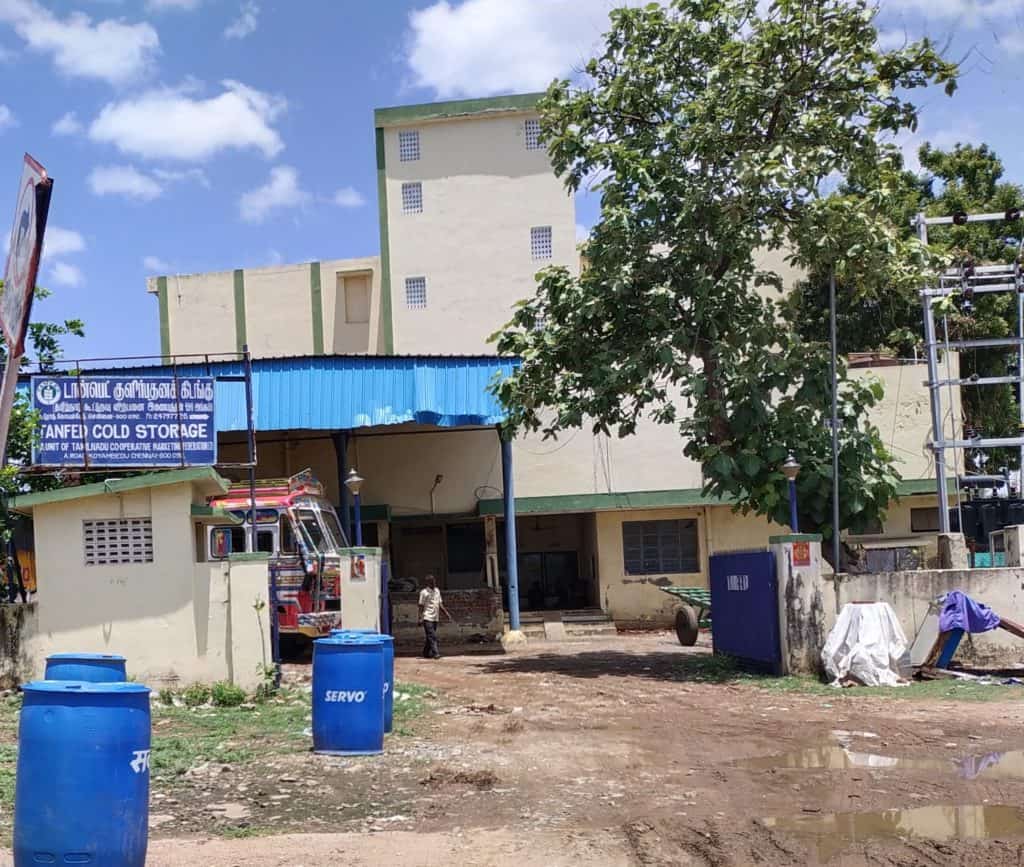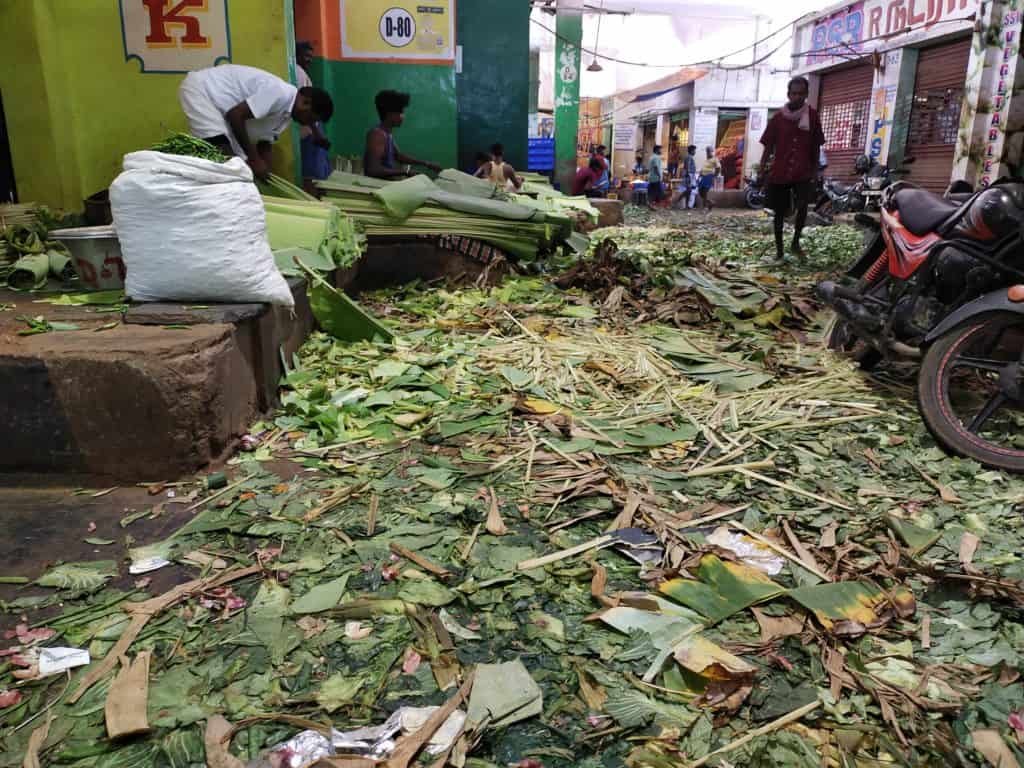Koyambedu wholesale market has been a one-stop centre for perishable goods for many residents and retail traders across the city for nearly 25 years now. However, waste management in the market campus remains to be himalayan task despite changing times.
“We come all the way from OMR road to buy the vegetables and fruits needed for a week. One major issue we have been witnessing is walking through the pathways in the market. Most of the time, the pathways are filled with waste from fresh vegetables and it becomes hard to navigate through the pathways during crowded times. At times of rain, it becomes more slippery and senior citizens find it more difficult to walk through these pathways,” said D Prakash, a resident.
What Prakash remarked was not an isolated case. It is something every individual, be it the public or the traders who walk into the market, faces on a day-to-day basis.
The aim of constructing Koyambedu Wholesale Market Complex (KWMC) over two decades ago was for the decongestion of the city by Chennai Metropolitan Development Authority(CMDA). But the market itself becoming a point of congestion and chaos, especially when it comes to waste management.
The challenges in managing the waste, curbing the use of banned single-use plastic bags and removing encroachments remain the same no matter which party rules the State, opined the public Citizen Matters spoke to.
Underlying causes of waste accumulation in Koyambedu Market
According to the CMDA website, KWMC, which is spread over an area of 295 acres, has a total of 3,194 shops among which 2,948 shops have been allocated to the traders.
While the public sees only the vegetable waste dumped on the ground, which makes it hard for them to walk through the pathways, the traders explain why they have no choice but to dump the waste where they do.
Vegetables like cabbage come with leaves when it reaches Koyambedu market from the farmers. The traders have to peel off those leaves before setting them on display for sale. According to a trader, D Jagan, at least 30 kilograms of leaf waste would be generated from a big sack of cabbage. Since there is no dedicated place to dump such kinds of waste, the traders tend to leave them in front of their shops on the pathways.

Lack of sufficient storage facility is yet another factor that leads to wastage even over two decades of the market’s functioning. Despite the market functioning for over two decades, there is still only one cold storage unit. It has not been renovated in years.
“The temperature in the unit is also not set according to the nature of the vegetables. Besides, the generator, which is supposed to be a backup power source for the cold storage unit, remains defunct, which sometimes damages the stored goods leading to wastage,” alleged the traders.
The traders are charged around Rs 20 to Rs 25 per box of goods per month. Usually, the goods are stored for a period of time, based on their nature. While apples could be stored for months, vegetables would be stored only for a day, they added.
While the shops built in the Koyambedu market campus were only meant for selling goods, the traders also started installing storage facilities inside the shops as the cold storage unit is not dependable though it remains to function.
On the other hand, small shops (measuring approximately 150 square feet) would not have enough space to store all the goods. In a bid to assist with storage facilities for these small shops, godowns were built. However, the traders alleged that these godowns (measuring over 2,500 sq ft) were sold to individuals by the CMDA. The godowns now function as large shops. Eventually, these small shops have no other option but to keep their stock and waste on the pathways amidst the piling garbage putting the hygiene of the goods available into question.
Waste in Koyambedu market turns into a health hazard
Fresh waste which gets dumped on the pathways is usually cleaned by sanitary workers deployed by private contractors. According to the traders, the market campus is cleaned twice a day. However, they alleged that the cleaning was not done properly.
Five months ago, a tender for waste management was floated and awarded to a new contractor. The situation has not improved even after the new contractor took charge.
“They clean larger open areas properly, while the narrow pathways are not cleaned properly. Tractors and tricycles are used to collect the waste. However, when tractors are used in such small pathways, it damages the concrete payment leading to water stagnation during rains. The water stagnation leads to mosquito breeding which in turn becomes a huge health hazard for both public and traders,” said a wholesale trader H Hussain.

“The load-men who usually walk barefoot get infected easily while walking through the muddy pathways Similarly, the contractors do not ensure cleaning of the areas behind the shops where garbage remains in heaped for days,” he added.
The CMDA charges Rs 1 per square unit of the shop as a maintenance charge per month. While the traders do not find it difficult to pay the charge, they seek proper use of the money collected.
The garbage collected in Koyambedu market gets dumped in a part of the open land inside the market campus from where it is transported for waste to energy conversion centres or to the dump yards. However, the dumped waste stays inside the market campus for the whole day leading to pollution.
While thousands of people walk in and out of the market on a daily basis, it is important for the authorities to ensure the waste is collected somewhere outside the campus and then transported accordingly, said SS Muthukumar, President of Chennai Koyambedu Market Vegetables Semi-wholesalers Association.
Menace of banned single-use plastic
Curbing the circulation of single-use plastic inside the market campus has been yet another challenging task for the authorities. The banned single-use plastic bags then add to the heaps of litter that already make the market unnavigable.
According to the traders, frequent inspections and hefty fines have stopped many traders from using the banned plastic bags. However, they said that the product remains in circulation despite many government initiatives.
Sources who sought anonymity said that the manufacturers have agents with the help of whom the banned plastic bags are hidden amidst the other sacks and are brought inside the market. They added that the government should start penalising the manufacturers before slapping fines on the traders.
“The goods would start reaching the market in the evening. By around 8 pm the plastic bags would be brought inside the campus. Before 9 pm it would all be distributed. Once the sales begin, the officials would come for surprise inspections and slap fines on the traders and sometimes seal the shops. At the end of the day, it is the traders who pay the price for using the plastic bags, while the government should rather curb the issue at its root and seal the manufacturing units,” the sources added.
Yet another target of the manufacturers is the makeshift shopkeepers who have set up retail shops by encroaching the roads near Koyambedu market and private bus stand. The public, who only want the minimum quantity of goods, prefer buying from the encroached retailers. This circulates the plastic bags from the manufacturers to the customers.
There has been a long-pending demand to clear the encroachers in Koyambedu. While hundreds of people have set up makeshift retail shops without any authorisation, many shops remain vacant inside the market campus. “This not only leads to revenue loss for the government but also keeps the cycle of pollution afloat,” commented CP Ramesh, Vice President of Chennai Koyambedu Market Vegetables Semi-wholesalers Association, seeking the government to clear the encroachments.
According to official sources from CMDA the market is to be revamped at a cost of Rs 20 crore which includes management of solid waste as a major thrust under the scheme. As of now, the officials said that waste management works are being monitored keenly.
Meanwhile, the CMDA has given a go-ahead for a pilot to convert waste into manure using new nano-gel technology. NGOs and Self Help Groups will also be roped in for the same. The officials also added that a study is underway on the encroachments in and around the market. Commenting on the circulation of banned single-use plastic, the officials said that regular inspections are being conducted and steps are being taken to curb the circulation.
Thanks for the update on Koyambedu market condition and not much of improvements for years, the vendors should aware of the Hygienic by informing them in a training on their way of understanding. CMBT Auto rickshaw drivers also cheat the public whenever possible and no efforts to control over them by police.
I have been to the old Market near Parry’s corner many decades ago and it was a hell hole. Koyambedu is much better but a lot of things can still be set right if the traders take responsibility.